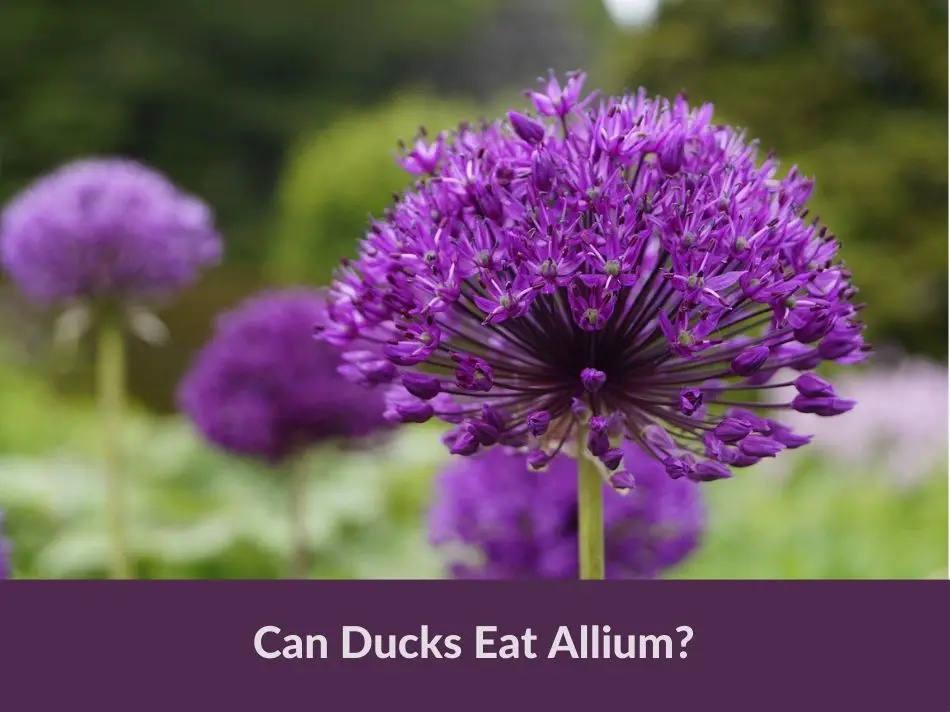Ducks are omnivorous birds that enjoy a varied diet, which typically includes a mix of aquatic plants, seeds, small fish, insects, and grains. In the wild, they forage for a natural diet, while domestic ducks might be fed a balanced diet of duck feed along with supplemental vegetables and fruits. But, can ducks eat allium?
No, ducks should not allium. It contains thiosulfate, which can cause oxidative damage to red blood cells, leading to hemolytic anemia.
This article provides insights into whether ducks can consume allium, a common genus of flowering plants that includes many types of edible bulbs. It will cover the nature of allium and its potential toxicity to ducks.
What is Allium?
Allium is a vast genus of flowering plants, commonly recognized by their bulbous growth and distinct, pungent odor. This genus includes a variety of species that are integral to culinary traditions around the world, such as onions, garlic, scallions, shallots, leeks, and chives.
These plants are easily identifiable by their layered, fleshy roots, which store energy and nutrients. Above ground, they exhibit long, slender leaves and sometimes produce spherical flower clusters that can add ornamental value to gardens.
The allium’s distinctive taste and smell come from sulfur-containing compounds that are released when the plant’s cells are broken, such as through chopping or crushing. These compounds are also responsible for the tears often associated with cutting onions.
Beyond their culinary uses, alliums have been used historically for medicinal purposes due to their antibacterial and antiviral properties. They are rich in vitamins and minerals and have been linked to a variety of health benefits in humans, including improved cardiovascular health and reduced risk of certain cancers.
Is Allium Toxic To Ducks?
Allium species, while beneficial to human health due to their antimicrobial and cardiovascular benefits, pose a risk to ducks. These plants contain thiosulfate, and although ducks are less sensitive to thiosulfate than some other animals, it can still lead to complications.
The ingestion of allium can result in hemolytic anemia, a condition where red blood cells are destroyed faster than they can be made. Symptoms of toxicity in ducks may include weakness, lethargy, pale mucous membranes, and even death in severe cases.
The degree of toxicity can vary based on the type of allium and the amount consumed. For instance, garlic and onions are generally more potent and, consequently, more dangerous. It is also important to note that cooking does not reduce the potential toxicity of these foods to ducks.
Caretakers should be vigilant, as ducks might inadvertently consume allium plants growing in or around their habitat, or they might be fed these foods by uninformed park visitors.
It is essential to educate those who enjoy feeding ducks on the appropriate foods to offer, steering clear of any allium species.
Other Flowers Ducks Can Eat
Ducks can safely enjoy a variety of flowers as part of their diet. Many common garden flowers are not only safe for ducks but also provide them with a source of vitamins and a change from their regular diet.
Here are five more flowers that ducks can eat, which can add both color and nutrition to their diet:
Remember to view our complete list of duck-friendly flowers and plants.
Conclusion
In conclusion, although ducks enjoy a variety of foods, allium plants are inappropriate for their consumption because of their toxic nature. Caretakers and park visitors should choose healthier, safer food alternatives when feeding ducks and ducklings. This practice supports the health of these birds and helps to meet their dietary requirements safely.
Disclaimer: The information in this article is for informational purposes only. I'm not an expert or a veterinarian.


